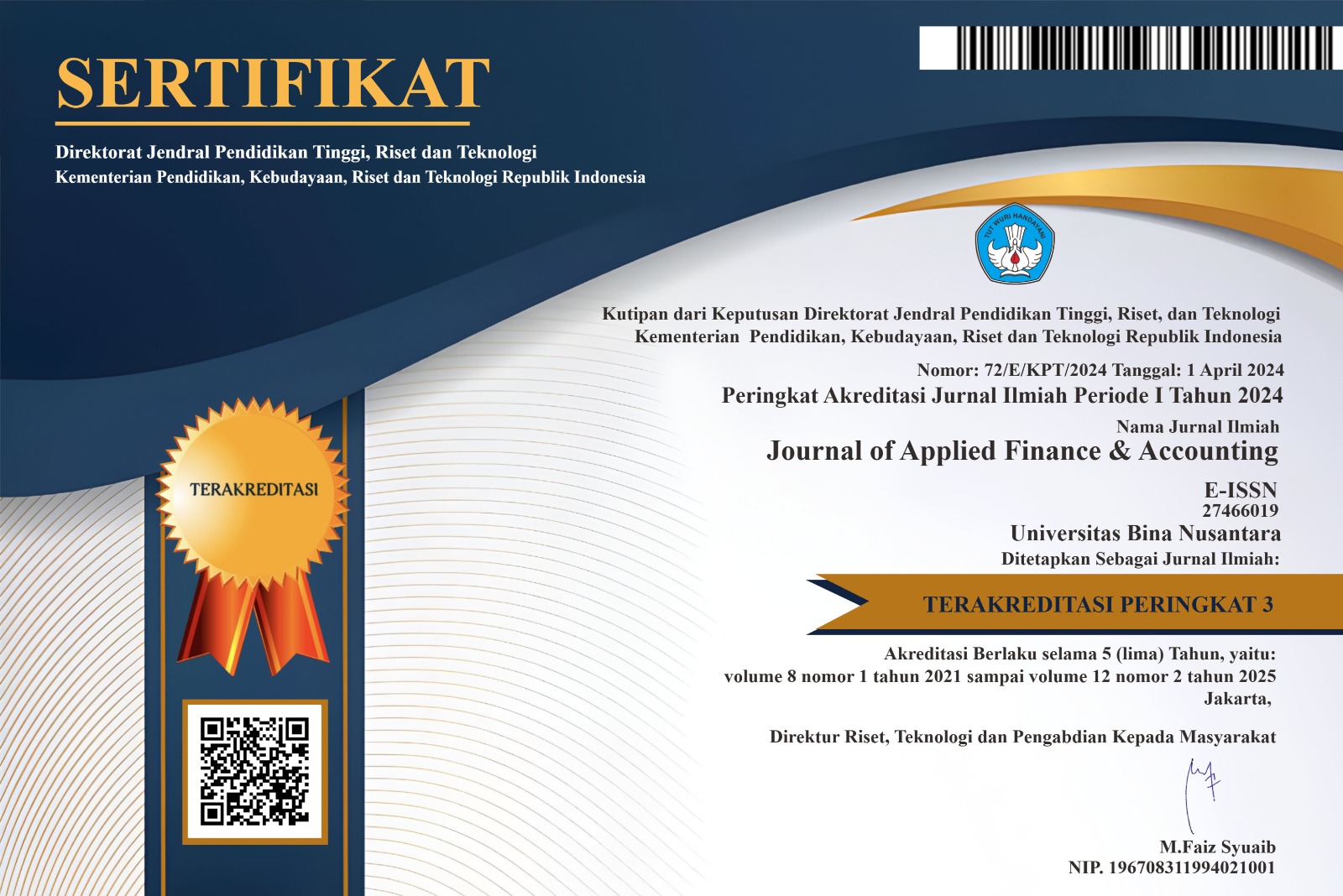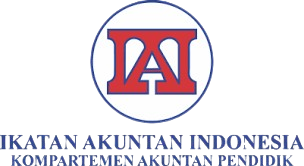THE EFFECT OF CAPITAL INTENSITY, EXECUTIVE CHARACTERISTICS, AND SALES GROWTH ON TAX AVOIDANCE
DOI:
https://doi.org/10.21512/jafa.v7i2.6378Keywords:
tax avoidance, capital intensity, executive character, sales growthAbstract
This study aims to examine and obtain empirical evidence about the effect of capital intensity, executive character, and sales growth on tax avoidance in Indonesia public listed consumer goods industry companies over the period of 2016-2018. Using a purposive sampling method, the sample selected in this study is 30 companies. This study uses multiple linear regression analyses to examine the effect of independent variables on the dependent variable. This study shows that capital intensity and executive characteristics have significant effects on tax avoidance. Meanwhile, sales growth has no significant effect on tax avoidance.
References
Cahyono, D. D., Andini, R., Raharjo, K. (2016). Pengaruh Komite Audit, Kepemilikan Institusional, Dewan Komisaris, Ukuran Perusahaan (SIZE), Leverage (DER) Dan Profitabilitas (ROA) Terhadap Tindakan Penghindaran Pajak (Tax Avoidance) Pada Perusahaan Perbankan Yang Listing BEI Periode Tahun 2011-2013. Journal Of Accounting, vol. 2, no. 2.
Dharma, N. B. S., Noviari, N. (2017). Pengaruh Corporate Social Responsibility dan Capital Intensity terhadap Tax Avoidance. E-Jurnal Akuntansi Universitas Udayana , vol. 18, no. 1.
Dyreng, S, Hanlon, M., Maydew, E. (2008). Long Run Corporate Tax Avoidance. The Accounting Review, vol. 83. no. 1, pp. 61-82.
Gupta, S., Newberry, K. (1997). Determinants of the Variability on Corporate Effective Tax Rates: Evidence from Longitudinal Data. Journal of Accounting and Public Policy, vol. 16, no. 1, pp. 1-34.
Irianto, B. S., Sudibyo, Y. A., Wafirli, A. (2017). The Influence of Profitability, Leverage, Firm Size and Capital Intensity Towards Tax Avoidance. International Journal of Accounting and Taxation, vol. 5, no. 2, pp. 33-41.
Jamil, N. A. (2017). Efektivitas Penerapan Tax Amnesty di Indonesia. Journal of Multidisciplinary Studies, vol. 1, no. 1.
Kartana, I. W., Wulandari, N. G. A. S. (2018). Pengaruh Karakter Eksekutif, Karakter Perusahaan, dan Corporate Governance terhadap Tax Avoidance. Jurnal KRISNA: Kumpulan Riset Akuntansi, vol. 10, no. 1.
Kasmir. (2011). Analisis Laporan Keuangan. Jakarta: PT. Rajagrafindo Persada.
Low, A. (2006). Managerial Risk-Taking Behavior and Equity-Based Compensation. Fisher College of Business Working Paper.
Nafis, M., Manik, T., Fatahurrazak. (2018). Pengaruh Return on Asset (ROA), Capital Intensity, Sales Growth, Debt to Asset Ratio (DAR), dan Firm Size terhadap Penghindaran Pajak (Tax Avoidance) pada Perusahaan Manufaktur yang Terdaftar di Bursa Efek Indonesia Periode 2012-2016. Repository Umrah.
Oktaviyani, R., Munandar, A. (2017). Effect of Solvency, Sales Growth, and Institutional Ownership on Tax Avoidance with Profitability as Moderating Variables in Indonesian Property and Real Estate Companies. Binus Business Review, vol. 8, no. 3, pp. 183-188.
Surachman, A. E. (2017). Influence of Executive Characteristics and Duality of Chief Executive Officer to Tax Avoidance. International Journal of Science and Research (IJSR), vol. 6.
Downloads
Published
Issue
Section
License
Authors who publish with this journal agree to the following terms:
Authors retain copyright and grant the journal right of first publication with the work simultaneously licensed under a Creative Commons Attribution License that allows others to share the work with an acknowledgement of the work's authorship and initial publication in this journal.
Authors are able to enter into separate, additional contractual arrangements for the non-exclusive distribution of the journal's published version of the work (e.g., post it to an institutional repository or publish it in a book), with an acknowledgement of its initial publication in this journal.
Authors are permitted and encouraged to post their work online (e.g., in institutional repositories or on their website) prior to and during the submission process, as it can lead to productive exchanges, as well as earlier and greater citation of published work (See The Effect of Open Access).





